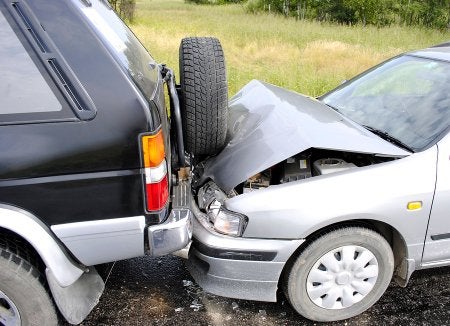-
What Injuries Can Cause Death in a Car Accident?
Which Car Accident Injuries are Most Commonly Fatal?
Certain injuries from car accidents are more likely to result in death than others. Here are some of the most common fatal injuries:
- Head injuries: Traumatic brain injuries, concussions, skull fractures, and contusions cause a majority of car accident deaths. These injuries can occur when the head strikes the steering wheel or another hard surface, causing the brain to shake within the skull. These injuries can lead to severe brain damage, coma, or death.
- Spinal cord injuries: The spinal cord connects the brain to the rest of the body, so damage here can result in paralysis or death.
- Internal bleeding: This type of injury occurs when the impact from a car accident causes blood vessels or organs to rupture. The danger lies in the fact that internal bleeding isn’t always immediately visible. By the time symptoms appear, it might be too late to save the victim.
- Chest injuries: Damage to the heart, lungs, and major blood vessels can be fatal. The force of a collision can fracture ribs and puncture internal organs. Blunt trauma to the chest can also cause cardiac arrest.
- Severe burns: Car accidents sometimes result in fires or explosions, leading to severe burns covering large areas of the body, which can be fatal.

Which Car Accident Types Result in the Most Deaths?
Certain types of car accidents are more likely to result in fatalities due to the nature of the impact and the forces involved. These include:
- Head-on collisions: This is when two vehicles traveling in opposite directions crash into each other front-first. These accidents are often fatal due to the speeds involved and the fact that the car’s front end, where the driver is seated, bears the brunt of the impact.
- T-bone accidents: Also known as side-impact collisions, T-bone accidents happen when the front of one vehicle crashes into the side of another. These accidents are particularly dangerous for the occupants on the side of the car that gets hit.
- Rollover accidents: Rollovers involve a vehicle flipping onto its side or roof. These accidents can be particularly deadly due to the potential for occupants to be ejected from the vehicle if they are not wearing seatbelts.
- Rear-end collisions: While generally less fatal than other accidents, rear-end collisions can still result in deaths, especially at high speeds. Fatalities are more likely if the rear-ended vehicle is pushed into oncoming traffic or other obstacles.
- Multi-vehicle pileups: Highways are the most common places for multi-vehicle pileups. These accidents are particularly deadly due to the high speeds at which they usually occur, the multiple impacts some cars sustain, and the difficulty for emergency responders to reach and treat victims quickly.
- Pedestrian, bicycle, and motorcycle accidents: Collisions involving victims who are not inside a car are often fatal due to the lack of protection. When a vehicle strikes a pedestrian, bicyclist, or motorcyclist, the force of the impact can cause life-threatening injuries, especially if the collision occurs at high speed.
What Steps Should I Take If a Car Accident Kills My Loved One?
Losing a loved one in a car accident is devastating. Here’s how to navigate this difficult time:
- Seek immediate medical help to get first responders on the scene. These professionals can confirm the death and provide any necessary documentation.
- Report the accident to the police and make sure a thorough investigation is conducted. Obtain a copy of the police report for future reference.
- Document the scene and gather contact information from witnesses.
- Notify your insurance company about the accident and the death of your loved one.
- Consult a car accident attorney who can guide you through the legal process and help you file a wrongful death claim.
Does Hiring a Car Accident Lawyer Help?
Relying on a car accident lawyer after losing a loved one in a car accident eases the burden during this difficult time. A lawyer can help you conduct a thorough investigation, gather evidence, and work with experts to build a strong case. Their negotiating skills help ensure fair compensation for your loss and reduce the chance of ending up in court. Even so, if your case goes to trial, a lawyer will represent you to achieve the best possible outcome.
Get Experienced Legal Help from a Car Accident Attorney in Tracy, CA
Nothing compares to losing a loved one in a tragic car accident. Bakerink, McCusker & Belden can support you legally and emotionally as we help you fight for justice. If your loved one was killed in an auto collision, contact us at (209) 835-9592 to request a free consultation. We’ll put our 35 years of legal experience to work for you
-
Examining the Roles of Contributory & Comparative Negligence
Personal injury cases rest on the concept of negligence. When you hire a personal injury lawyer, he or she will consider the role of negligence in your case, including whether the negligence rests solely with the other party or if you contributed to the accident in any way. If you can be proven to have a role in causing the accident, your lawyer in Tracy may adjust the kind of compensation he or she pursues on your behalf. These concepts are known as contributory and comparative negligence, depending on the laws in your state. Here is what you need to know.

Contributory Negligence
Contributory negligence is a system used in only a handful of states: Maryland, Alabama, Virginia, North Carolina, and Washington, D.C. Under this system, accident victims who were responsible for any part of an accident can be prevented receiving any compensation at all for their injuries. Even if the role of victims was very small and their injuries are severe, the contributory negligence system means that they may be full responsible for all of their own damages, including long-term financial problems caused on ongoing medical bills or the inability to work. The all-or-nothing nature of contributory negligence is the reason it is only used in a small number of states. Other states have decided that contributory negligence is too extreme and instead rely on comparative negligence.
Comparative Negligence
The comparative negligence system lets defendants in personal injury cases mount a partial defense, in which they argue that the victim has some degree of responsibility for the accident, so they should only be eligible to receive a reduced amount of compensation. Usually, this is expressed as a percentage, and the assigned percentage of responsibility is the percentage of available compensation the victim receives. In some states, including California, there is a pure comparative negligence system, in which victims can receive compensation even if they were more negligent than the defendant. In modified comparative negligence states, accident victims must be less negligent than defendants to receive damages in a personal injury case.
““
-
What Not to Say After a Car Crash
Personal injury lawyers in Tracy and Manteca can assist you in securing compensation after a car accident . Unfortunately, many car crash victims inadvertently compromise the influence of their personal injury lawyer by saying the wrong things to the other driver. Since your personal injury lawyer won’t be on the scene to guide you, it’s important to know the ins and outs of conversing with the other driver after a crash.

Although you’ll need to gather certain information from the other driver such as the driver’s license number and contact information, you should refrain from discussing anything else with him or her. In particular, injury lawyers strongly recommend not discussing the specifics of the crash, such as which party made which mistakes. Never apologize for the crash because this can be misinterpreted as an admission of fault. The insurance carrier will attempt to pin the blame on you, even if you truly weren’t at fault, and apologizing to the other driver will only serve to substantiate the case against you.
RECENT POSTS
categories
- Uncategorized
- Personal Injury
- Estate Planning
- customer reviews
- Financial Planning
- Work Injury
- Tracy Lawyer
- Attorney
- Dog Bites
- Auto Accident
- Slip and Fall
- Car Accident
- Living Trusts
- Trust Administration
- Living Will
- Wrongful Death
- Probate
- advanced health care directive
- About Us
- Russian linguist
- Infographic
- Wills and Trusts
- Will
- Car Crash
- Executor
- Whiplash Injuries
- Estate Taxes
- Slip and Fall Injury
- Auto Accident Claims
- Intestate Succession
- Disinheritance
- Trust Administrators
- Cycle Accident
- Accident
